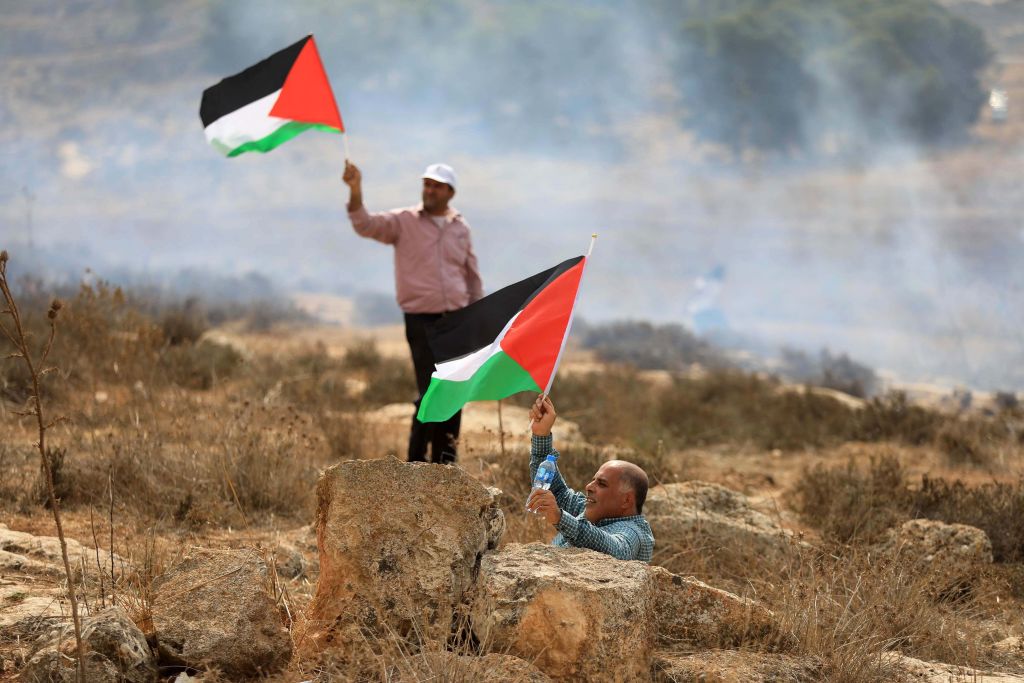“The Israeli judge and prosecutor threatened him in court saying ‘You won over us 5 times, this will not happen this time.’” Randa Musa, Khader Adnan’s wife, recalled on the day of his death, after 86 days of hunger strike. And yet he did win one last time.
Khader Adnan is an ex-political prisoner freed from Israeli jails by 5 victorious hunger strikes. His last hunger strike led to his death – a tragic sacrifice, an extreme act of struggle. Still, Israel was not able to break him. “He died before Israel could implement their threats to force-feed him. Thank God,” Randa explained, “even in his martyrdom they did not win the fight against his resilience”. Even in his death, Khader teaches us a lesson of steadfastness and how not to surrender or compromise the Palestinian struggle.

Upon the news of his death, the Palestinian Prisoners Movement announced a state of “full alert” and is considering a mass hunger strike. All cities of the West Bank announced a 1-day strike and took to the streets, while Gaza was subjected to air bombing by Israel in light of Khader’s death.
Khader Adnan was a loving husband and father of nine children, and an owner of a bakery in his hometown of Arraba, Jenin. He lived and enjoyed all of this in between detention periods as a political prisoner in Israeli jails. Khader was arrested throughout his life 11 times, and in an arbitrary manner. Israel arrested him the first time in 1999 as a Mathematics student in Birzeit University. Adding up the various periods he spent in Israeli jails, he was imprisoned for a total of 9 years.

“I die for you to live”
Within the struggle of the political prisoners, control over their own bodies and actions is a crucial element of resistance to Israel’s crimes against all Palestinians. Refusing any vitamins or medical assistance during a hunger strike that would prolong the prisoner’s life is a decision that might seem suicidal to an outsider’s eye. However, the choice not to eat is one of the rare remaining independent choices prisoners still have control over.
Hence, this choice is used to defend the freedom of prisoners against their arbitrary arrest. “I starve myself for you to remain. I die for you to live. Stay with the revolution.” Khader said in a letter he wrote during the 2012 hunger strike, reasserting that hunger strikes are a means of resistance against the Israeli settler colonial enterprise and its crimes.

“Khader defined victory in either martyrdom or freedom,” Leena Meari, the head of the Birzeit University worker’s union, said. “As long as he does not surrender, his dignity remains,” she explains. This leaves no space for compromise with the Israeli authorities and creates an incredibly high threshold, to which the steadfastness of a prisoner can reach.
Khader’s lesson: Only if we give up can they defeat us.
Khader Adnan has been a leader in hunger strikes and remains a model for others to follow. Since his first hunger strike in 2004, he has dedicated his life to this fight. In 2012, Khader turned into a national hero. His 66-day long hunger strike was the longest-running hunger strike among Palestinian prisoners at the time. It shed light on apartheid Israel’s cruel practice of ‘administrative detention’, a procedure under which the Israeli military holds Palestinian prisoners indefinitely based on secret information without charging them or allowing them to stand trial.
Since then, Khader has stood to support all hunger strikes. The streets of Ramallah, Jenin, Nablus, and Hebron witnessed him protesting to support the prisoners’ movement. And in calling the people to take action against Israeli crimes. Palestinians knew him, not only for his hunger strikes but also for his commitment to the struggle inside and outside of detention. His philosophy of resistance made Khader Adnan a target for Israel, aiming to break his steadfastness, for the mere reason of being an example of resilience in the Palestinian struggle. Hence, people take pride in him and find strength to continue the struggle for which he died..
“He is a role model to all Palestinians. Khader practised steadfastness, resilience, and faith in our victory every day,” Mohammed Khateeb, a student activist at Birzeit University praised him during a protest the day after Khader’s death. “He allowed no one to take away his dignity or freedom and taught us that the occupier will defeat us only if we give up,” Mohammed added, explaining Khader Adnan’s importance in the Palestinian society.
Israel also launched media campaigns against him, attempting to tarnish his reputation. Evidently, all efforts by Israel failed. Khader never surrendered till his last days. In the last will he wrote before being found dead in his cell, he called all Palestinians and people of consciousness to “ not despair, no matter what the occupiers might do”.

The struggle continues…
“We, Khader Adnan’s family, will not receive any condolences, and will not open our house for mourners, but for congratulations for Khader’s martyrdom,” Adnan’s wife, Randa said in a brief speech following the news of his death. The family of Khader Adnan and Palestinian society at large consider Khader’s death a victory that nurtures Palestinian determination to fight for freedom and justice.
Today, there are other political prisoners in danger. Most prominently Walid Daqqa who is suffering from myelofibrosis, a rare bone marrow cancer. Further, Israel withheld Khader’s body from his family, depriving them from a proper burial and farewell. By learning from Khader Adnan’s journey and philosophy, take action for Walid Daqqa and all political prisoners.
The Palestinian Human Rights Organizations (PHROC) denounced the “as a premeditated murder by the state of Israel” and demands the “international community must hold Israel accountable for the structural violence undertaken by the Israeli Prison Service against Palestinian prisoners and detainees, demand an immediate end to the widespread and systematic administrative detention of Palestinians amounting to apartheid”.




